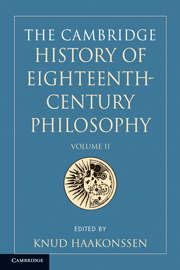Book contents
- Frontmatter
- III Philosophy and Theology
- 21 Natural and Revealed Religion
- 22 Revealed Religion: the Continental European Debate
- 23 Revealed Religion: The British Debate
- 24 Arguments for the Existence of God: The British Debate
- 25 Arguments for the Existence of God: The Continental European Debate
- 26 The Problem of Theodicy
- 27 Religion and Society
- IV Natural Philosophy
- V Moral Philosophy
- Biobibliographical Appendix
- Bibliography
- Index nominum
- Index rerum
- References
24 - Arguments for the Existence of God: The British Debate
from III - Philosophy and Theology
Published online by Cambridge University Press: 28 March 2008
- Frontmatter
- III Philosophy and Theology
- 21 Natural and Revealed Religion
- 22 Revealed Religion: the Continental European Debate
- 23 Revealed Religion: The British Debate
- 24 Arguments for the Existence of God: The British Debate
- 25 Arguments for the Existence of God: The Continental European Debate
- 26 The Problem of Theodicy
- 27 Religion and Society
- IV Natural Philosophy
- V Moral Philosophy
- Biobibliographical Appendix
- Bibliography
- Index nominum
- Index rerum
- References
Summary
In eighteenth-century Britain, rational religion was much in vogue, and every year saw works of no great originality rolling off the presses. They embraced a wide spectrum of theological opinion. The majority considered that both theistic belief in general and belief in the Christian revelation in particular were founded on solid reasoning, even though the revelation itself was subject to significantly different interpretations among Athanasians, Arians, Arminians, and others. Some, while sharing the view that reason was the only possible foundation, set stringent limits to what was believable, but they normally conceded enough of the initial principles of theism to make it difficult for critics to pin on to them any firmly sustainable charge of atheism. Hume’s subversive Dialogues concerning Natural Religion, written in the 1750s but published only posthumously in 1779, challenged this culture of reason and has had a lasting influence on subsequent debate; but it was not through this work, whose literary form presents a frequently ambiguous message, that he had his main impact at the time. His sceptical philosophy, particularly in more accessible writings such as An Enquiry concerning Human Understanding (1748), challenged what had hitherto seemed to be basic certainties across a wide front. The implications for religious certainties were clear enough, even without the provocation of his gentle irony, but they could not easily be answered without addressing a whole philosophy.
- Type
- Chapter
- Information
- The Cambridge History of Eighteenth-Century Philosophy , pp. 710 - 730Publisher: Cambridge University PressPrint publication year: 2000
References
- 2
- Cited by

